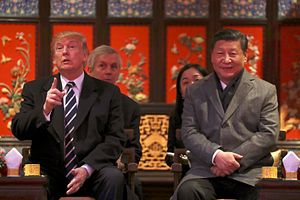Douglas Brinkley, professor of history at Rice University, once said, “The world of high-stakes international diplomacy can be rough and tumble, but it’s more often than not a procession of suits and summits, protocol sessions, and photo ops.”
As the worldwide media has been closely following in recent days, both Japan and South Korea have gone all out to welcome U.S. President Donald Trump and his wife Melania Trump by offering them the best catering and entertainment — aside from the real business of talks. Japanese Prime Minister Shinzo Abe, in particular, gave Trump a custom cap that reads: “Donald & Shinzo, Make Alliance Even Greater,” played nine holes of golf with Trump, fed koi with Trump in a beautiful Japanese garden, and constantly complimented Trump on various occasions. All these details have been widely broadcast in Chinese media.
Yet, China — as a master of protocol, developed over hundreds of years considering etiquette, hierarchical manners, and rituals — is determined to win the protocol race and beat the other four competitors (Japan, South Korea, Vietnam, and the Philippines) during Trump’s three-day stay in Beijing. China’s foreign ministry has already announced to the public that China will give a “state visit plus” reception to Trump.
On November 7, Chinese foreign ministry spokesperson Hua Chunying said at the regular press briefing:
When President Xi Jinping visited Mar-a-Lago this April, President Trump and his wife offered a hospitable and considerate reception to President Xi Jinping and his wife with high standard and thoughtful arrangements being made in all respects. We Chinese people believe that courtesy calls for reciprocity. The Chinese side attaches great importance to President Trump’s visit to China. Besides the whole set of activities for the state visit, the Chinese side will also arrange the small-group and informal interactions between the two heads of state, which can give them enough time to have an in-depth exchange of views on major issues of common interest… I am convinced that through the concerted efforts of the work teams of both sides, this visit will achieve historic success.
Trump arrived in Beijing in the afternoon of November 8, local time, and will leave Beijing for Vietnam the morning of November 10. According to multiple press reports, since the Trump couple arrived in Beijing, they have received the highest-level treatment.
On the first evening, Xi and his wife Peng Liyuan invited the Trumps to the Forbidden City — the ancient imperial palace — for a private meeting. The Forbidden City, the most popular tourist attraction in Beijing, was closed to the public for the whole day of October 8. The two couples had a tea party at the Baoyun Building, or the Hall of Embodied Treasures, which currently serves as an internal museum to show the history of the Forbidden City. According to a Hong Kong newspaper, they might have a private dinner at the Jianfu Palace, which was Chinese Emperor Qianlong’s (1711-1799) favorite place. The Jianfu Palace is a real forbidden location within the Forbidden City, since it is not open to the ordinary public. The Forbidden City’s media office told the Global Times that a trial run exercise for Trump’s visit had already been conducted early this week.
On the morning of November 9, Trump will attend a state-level welcoming ceremony in the Great Hall of the People — where the 19th Party Congress just took place — and then have an official meeting with Xi. He will also meet with entrepreneurs and media reporters. At night, Trump will attend a state banquet and watch theatrical performances.
In addition to providing Trump the best personal treatment, China is also well-prepared to sign multi-billion-dollar deals with the U.S. business delegation, so as to check the “make America great again” box on Trump’s diplomatic agenda.
Based on the full itinerary listed above, it is clear that China is going all out to woo Trump with its “state visit plus” reception.

































